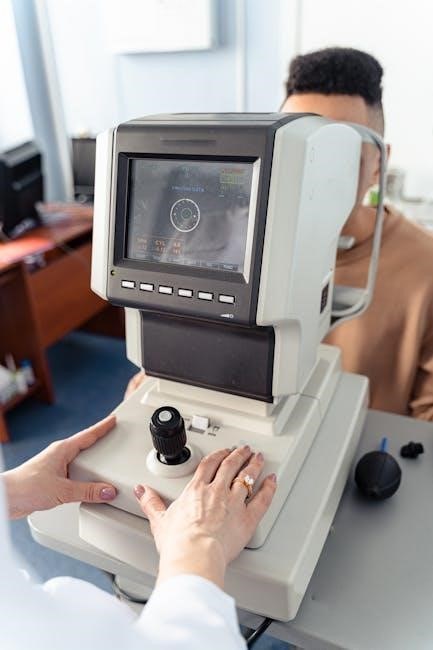Brief cognitive assessment tools are essential for quickly evaluating mental functions in clinical and research settings, focusing on memory, executive functions, and attentional capacity to identify impairments efficiently.
Definition and Purpose
The Brief Cognitive Assessment Tool (BCAT) is a concise, evidence-based instrument designed to evaluate key cognitive domains, such as memory, executive functions, and attentional capacity. Its primary purpose is to provide healthcare professionals with a quick and reliable method to identify cognitive impairments, aiding in early detection and monitoring of conditions like dementia. The BCAT is particularly valued in clinical and research settings for its efficiency in screening and guiding further assessments when necessary.
Importance in Clinical and Research Settings
The BCAT is vital in clinical settings for early detection of cognitive decline, enabling timely interventions. In research, it standardizes data collection, ensuring reliable outcomes. Its brevity and accuracy make it ideal for assessing diverse populations, aiding in both diagnosis and monitoring disease progression. This tool bridges clinical practice and research, enhancing understanding of cognitive impairments and improving patient care through efficient, evidence-based assessments.
Understanding Cognitive Assessment
Cognitive assessment evaluates mental processes like memory, attention, and problem-solving, helping identify impairments and guide interventions, ensuring accurate diagnosis and personalized care plans.
What is Cognitive Assessment?
Cognitive assessment is the evaluation of mental processes such as memory, attention, problem-solving, and executive functions. It helps identify impairments, monitor progression, and guide interventions. Tools like the BCAT are designed to measure these abilities efficiently, providing insights into cognitive health. Assessments are crucial in clinical and research settings to detect early signs of decline and ensure timely support. They enable healthcare professionals to develop personalized care plans tailored to individual needs.
Key Domains of Cognitive Function
The primary cognitive domains include memory, attention, executive functions, language, and visuospatial skills. Memory involves storing and retrieving information, while attention focuses on selective concentration. Executive functions encompass planning, decision-making, and problem-solving. Language abilities relate to communication, and visuospatial skills involve understanding spatial relationships. Assessments like the BCAT target these areas to provide a comprehensive understanding of cognitive health, ensuring early detection of impairments and guiding effective interventions.
The Role of Screening Tools in Early Detection
Screening tools like the BCAT play a crucial role in early detection of cognitive impairments by identifying subtle changes in memory, attention, and executive functions. Their brevity allows for quick administration in clinical settings, enabling timely interventions. Early detection is vital for improving outcomes, as it facilitates prompt medical evaluations and personalized care plans. These tools are particularly valuable in primary care, where time is limited, ensuring that cognitive issues are addressed before they progress significantly.
Overview of the Brief Cognitive Assessment Tool (BCAT)
The BCAT is a concise screening tool designed to assess contextual memory, executive functions, and attentional capacity, providing insights into cognitive health in clinical and research settings.
Development and Design
The BCAT was developed to provide a concise yet comprehensive assessment of cognitive functions, focusing on contextual memory, executive functions, and attentional capacity. Designed for clinical and research settings, it emphasizes practicality and accuracy. The tool underwent rigorous testing to ensure reliability and validity, making it suitable for diverse populations. Its design prioritizes ease of administration while maintaining depth in evaluating cognitive impairments, catering to both clinicians and researchers seeking efficient assessments.
Structure and Components
The BCAT consists of multiple sections, each targeting specific cognitive domains. It includes tasks assessing contextual memory, executive function, and attentional capacity. The tool is structured to be administered in a short time frame, ensuring efficiency without compromising accuracy. Clear instructions and standardized scoring guidelines are provided, making it accessible for various users. Its components are designed to identify cognitive impairments effectively, offering a balanced approach between brevity and comprehensiveness for clinical and research applications.
Advantages Over Longer Assessments
The BCAT offers significant advantages over longer assessments, primarily through its time efficiency and ease of use. It allows for quick evaluation in busy clinical settings, reducing patient fatigue and improving engagement. The tool’s brevity ensures that key cognitive domains are assessed without unnecessary complexity, making it ideal for initial screenings. This efficiency supports timely decision-making and resource allocation, proving particularly beneficial in primary care and research environments where comprehensive testing isn’t feasible or necessary. Its concise design enhances accessibility and practicality.

Key Features of the BCAT
The BCAT emphasizes contextual memory, executive function, and attentional capacity, utilizing practical tasks and questionnaires to assess cognitive abilities effectively, aiding in early detection and intervention strategies.
Contextual Memory Assessment
The BCAT includes tasks designed to evaluate an individual’s ability to recall specific events or experiences within a particular context. This component focuses on episodic memory, which is crucial for daily functioning. By using real-world scenarios and structured prompts, the assessment provides insights into how well a person can encode, store, and retrieve contextual information. This feature helps identify early signs of cognitive decline, such as difficulties in remembering recent events or learning new information. Accurate results enable targeted interventions and support planning.
Executive Function Evaluation
The BCAT evaluates executive function, assessing skills like planning, decision-making, and problem-solving. Tasks such as sorting objects or completing verbal fluency tests measure cognitive flexibility and strategic thinking. These exercises help identify impairments in high-level cognitive processes, which are critical for daily tasks and independent living. Early detection of deficits in executive function allows for timely interventions, making the BCAT a valuable tool in both clinical and research settings for monitoring cognitive health effectively.
Attentional Capacity Testing
Attentional capacity testing within the BCAT evaluates an individual’s ability to concentrate, sustain focus, and shift attention between tasks. This is assessed through tasks requiring selective attention and mental flexibility. The tool measures how effectively one can process information and manage distractions, which are vital for daily functioning. Identifying attentional deficits early can guide targeted interventions, enhancing overall cognitive and functional outcomes. This component of the BCAT ensures a comprehensive understanding of attention-related cognitive abilities in a time-efficient manner.

Using the BCAT in Practice
The BCAT is a practical tool for assessing cognitive function in clinical settings, evaluating attention, memory, and executive functions efficiently to guide targeted interventions and track patient progress.
When to Use the BCAT
The BCAT is ideal for primary care settings where time is limited. It effectively screens for cognitive impairments in patients with suspected dementia or those showing signs of cognitive decline. The tool is particularly useful during routine check-ups or when patients exhibit memory concerns. Its brevity makes it suitable for repeated use to monitor progress without causing patient fatigue. This ensures early detection of cognitive issues, enabling timely interventions and referrals for comprehensive evaluations if necessary.
How to Administer the Assessment
The BCAT is administered in a structured, time-efficient manner, typically lasting 10–15 minutes. Ensure a quiet, distraction-free environment and use the provided stimuli images if necessary. The test includes a short form with 21 points, assessing memory, executive functions, and attention. Administer each task sequentially, following the guide. Scoring is straightforward, with clear scoring criteria for accuracy; Results are interpreted to determine if further evaluation is needed, making it ideal for primary care settings. Training materials are available for administrators to ensure consistency and reliability.
Interpreting Results and Next Steps
Results are calculated by summing scores across tasks, with higher scores indicating better cognitive function. Cutoff scores help identify impairment levels. Lower scores may suggest cognitive decline, warranting further evaluation. Next steps include referring patients for comprehensive assessments or developing targeted intervention plans. Results can also guide monitoring over time to track progression or improvement. Proper interpretation ensures timely and appropriate clinical decisions, making the BCAT a valuable tool for patient care and management;
Reliability and Validity
The BCAT demonstrates strong test-retest reliability, ensuring consistent results over time. Its inter-rater reliability is high, with minimal variability among administrators. Validity across diverse populations supports its effectiveness in accurately assessing cognitive function, making it a reliable and consistent tool for clinical and research use.
Test-Retest Reliability
The BCAT exhibits strong test-retest reliability, ensuring consistent results across administrations. This stability is crucial for tracking cognitive changes over time, particularly in clinical and research settings. High reliability scores indicate that the tool accurately measures cognitive function without significant variability, making it a dependable instrument for longitudinal assessments and reliable data collection.
Inter-Rater Reliability
Inter-rater reliability refers to the consistency of assessment results when different evaluators administer the same tool. The BCAT demonstrates high inter-rater reliability, ensuring that results are consistent across various administrators. This is achieved through standardized training and clear instructions, minimizing variability in scoring. Such reliability is vital in clinical settings, where accurate and reproducible results are essential for dependable patient evaluations and research outcomes.
Validity in Diverse Populations
The BCAT has demonstrated strong validity across diverse populations, ensuring accurate cognitive assessments for individuals of varying ages, educational backgrounds, and cultural contexts. Its design incorporates culturally neutral questions to minimize bias, making it suitable for global use. Validation studies have confirmed its effectiveness in different languages and settings, ensuring reliable results in both clinical and research applications. This adaptability makes the BCAT a robust tool for assessing cognitive function in heterogeneous populations.
Comparison with Other Cognitive Tools
The BCAT stands out for its brevity and focus on contextual memory, distinguishing it from longer assessments like the MMSE and MoCA, while maintaining reliability.
BCAT vs. Mini-Mental State Examination (MMSE)
The BCAT and MMSE both assess cognitive function but differ in scope and application. The BCAT is shorter, focusing on contextual memory and executive functions, making it ideal for quick assessments. In contrast, the MMSE is more comprehensive, covering orientation, memory, attention, and language, but requires more time. While the MMSE is widely used and validated, the BCAT offers a more streamlined approach, emphasizing practical cognitive abilities in real-world contexts, enhancing its utility in fast-paced clinical environments.
BCAT vs. Montreal Cognitive Assessment (MoCA)
The BCAT and MoCA differ in their approaches to cognitive assessment. The BCAT is more concise, focusing on contextual memory, executive functions, and attention, making it ideal for quick evaluations. The MoCA, while also brief, covers a broader range of cognitive domains, including visuospatial abilities and language, often detecting mild cognitive impairment more effectively. Both tools are validated but serve different purposes, with the BCAT offering efficiency and the MoCA providing a more detailed cognitive profile, making it a popular choice in both clinical and research settings.
Unique Selling Points of the BCAT
The BCAT stands out for its emphasis on contextual memory, which enhances real-world applicability, and its streamlined design, reducing administration time. It also provides a balanced evaluation of executive functions and attentional capacity, offering a comprehensive yet efficient assessment. Its adaptability across diverse settings and populations further underscores its utility, making it a valuable resource for both clinical practice and research environments focused on quick and accurate cognitive evaluations.
Training and Resources
Training and resources for the BCAT are designed to ensure accurate administration and interpretation, with materials available for healthcare professionals to enhance their assessment skills effectively.
Who Can Administer the BCAT?
The BCAT can be administered by healthcare professionals, including psychologists, nurses, and clinicians, who have undergone specific training. While specialized expertise in neuropsychology is beneficial, the tool is designed to be accessible to a range of professionals. Proper training ensures accurate assessment and interpretation of results, making it a versatile option for early detection and monitoring in various clinical settings. This accessibility helps in identifying cognitive impairments efficiently across diverse patient populations.
Training Requirements
Administering the BCAT requires completion of a standardized training program, which covers test administration, scoring, and interpretation. The training ensures consistency and accuracy across assessors. It typically includes both theoretical knowledge and practical exercises. Additionally, ongoing professional development is recommended to stay updated on best practices. This structured approach ensures reliable and valid results, maintaining the tool’s effectiveness in clinical and research settings. Training materials are available online, facilitating easy access for professionals globally.
Accessing BCAT Materials and Guides
BCAT materials and guides are readily available online, including the assessment tool, stimulus images, and electronic scoring resources. Users can access these through the official BCAT website or reputable academic platforms. Additional training manuals and interpretation guides are provided to ensure proper administration and analysis. Free cognitive assessment tools, such as BCAT Self-Assessment Tools, BCRS, FAST, and GDS, are also accessible for clinical and research purposes, offering comprehensive resources for professionals.

Case Studies and Real-World Applications
Real-world applications of the BCAT include successful implementation in clinical settings, such as long-term care facilities and primary care, aiding in early detection and monitoring of cognitive decline.
Successful Implementation in Clinical Settings
The BCAT has been effectively integrated into clinical practices, particularly in long-term care and primary care settings, where it aids in early detection of cognitive impairments. Its brevity and focused structure enable healthcare providers to quickly assess patients, ensuring timely interventions. The tool’s reliability and validity make it a valuable resource for monitoring progression and guiding treatment plans, ultimately improving patient outcomes and streamlining clinical workflows.
Examples in Research Studies
The BCAT has been utilized in various research studies to assess cognitive impairments, particularly in tracking progression in dementia patients. Its structured format facilitates consistent data collection, enabling researchers to analyze trends and effectiveness of interventions. For instance, in clinical trials, the BCAT has been employed to evaluate the impact of new treatments on cognitive functions, providing valuable insights for further investigation and development in the field of cognitive assessment.
Patient Outcomes and Feedback
The BCAT has demonstrated positive patient outcomes by enabling early detection of cognitive impairments, leading to timely interventions. Feedback from patients and clinicians highlights its effectiveness in monitoring progression and adapting treatment plans. Patients appreciate its non-invasive nature, while clinicians value its ability to provide clear, actionable insights. The tool has also been praised for reducing assessment-related anxiety due to its brevity, making it a patient-friendly option in clinical settings.

Future Directions and Updates
The BCAT is evolving with technological advancements, including digital integration and AI-driven analytics, to enhance accuracy and accessibility for diverse clinical and research applications globally.
Evolution of the BCAT
The BCAT has undergone significant updates to enhance its effectiveness, incorporating digital integration and AI-driven analytics for improved accuracy. These advancements aim to expand its accessibility and adaptability across diverse clinical and research settings, ensuring it remains a reliable tool for cognitive assessment. Ongoing refinements focus on addressing emerging needs in cognitive evaluation, making it a dynamic and evolving resource for healthcare professionals and researchers worldwide.
Technological Integration
The BCAT has embraced technological advancements, offering an online platform for administration and digital scoring. This integration enables faster, more accurate results and real-time data analysis. AI-driven insights enhance interpretation, aiding in early detection of cognitive impairments. The tool is also accessible via mobile devices, improving accessibility in diverse settings; These innovations ensure the BCAT remains a cutting-edge, efficient, and reliable cognitive assessment solution, supported by robust data security measures to protect sensitive information.
Expanding Use Across Different Conditions
The BCAT is increasingly being adapted for use in various neurological and psychiatric conditions, such as traumatic brain injuries, schizophrenia, and monitoring treatment effects. Its versatility allows healthcare providers to assess cognitive impairments beyond dementia, ensuring comprehensive care. This expansion highlights the tool’s potential to aid in early detection and management of diverse conditions, making it a valuable asset in both clinical and research settings.
The BCAT stands out as a valuable, efficient tool for cognitive assessment, offering insights into memory, executive functions, and attention, while adapting to diverse clinical and research needs.
The BCAT is a concise yet comprehensive tool for assessing cognitive functions, emphasizing contextual memory, executive functions, and attentional capacity. It is designed for quick administration, making it ideal for clinical and research settings. The tool has demonstrated strong reliability and validity, ensuring accurate and consistent results. Its adaptability across diverse populations and conditions further enhances its utility. By focusing on key cognitive domains, the BCAT provides valuable insights into mental functioning, aiding in early detection and intervention.
The BCAT as a Valuable Resource
The BCAT serves as a valuable resource for clinicians and researchers, offering a concise yet thorough evaluation of cognitive functions. Its design emphasizes contextual memory, executive functions, and attentional capacity, making it highly effective for detecting impairments. The tool’s reliability and validity ensure accurate assessments, while its brevity allows for efficient use in diverse settings. By providing actionable insights, the BCAT aids in early intervention and supports tailored treatment plans, enhancing patient outcomes and advancing cognitive research.
Final Thoughts on Cognitive Assessment Tools
Cognitive assessment tools like the BCAT are indispensable in clinical and research settings. Their reliability and validity ensure accurate evaluations, aiding in early detection and personalized care. These tools guide targeted interventions, improving patient outcomes. Their efficiency and effectiveness make them valuable for advancing research and ensuring comprehensive cognitive care. They are essential for enhancing our understanding and management of cognitive health.
